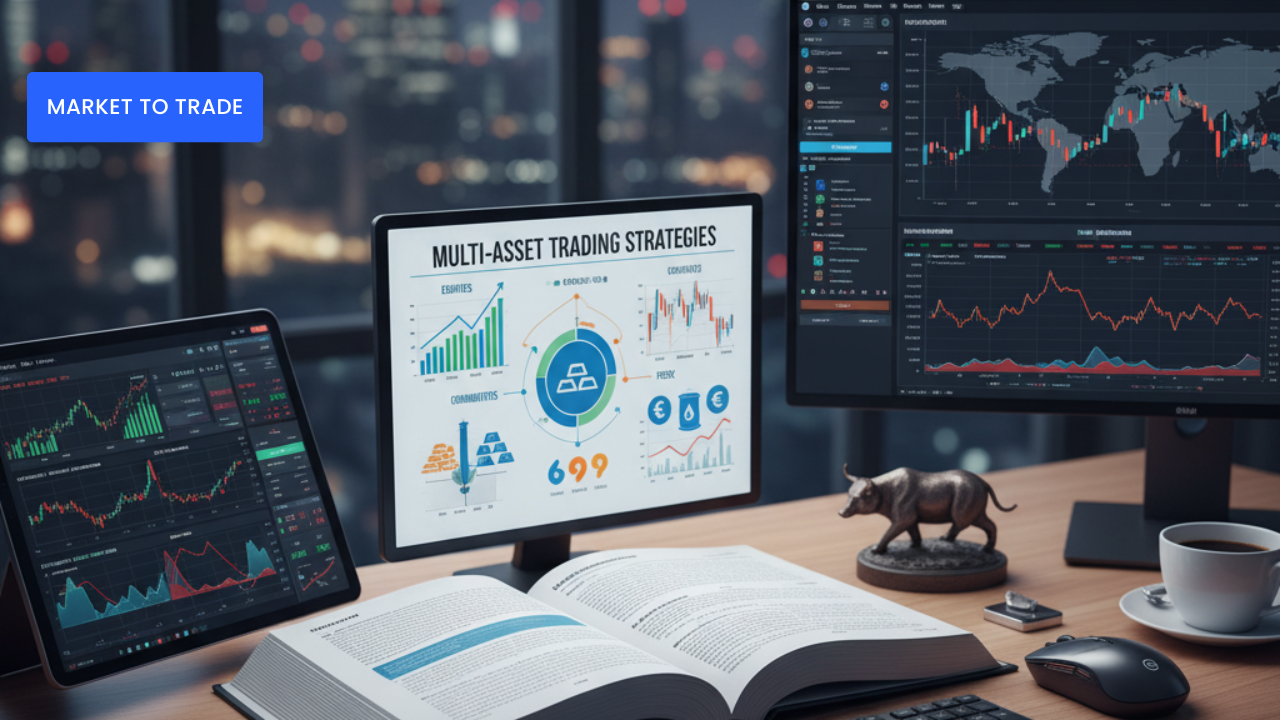How to Analyze, Diversify, and Manage Risk Across Different Markets
In today’s global economy, markets don’t move in isolation. Currencies, commodities, stocks, and indices often influence each other — sometimes in predictable ways.
That’s why many traders now use multi-asset trading strategies — combining different markets to find opportunities, manage risk, and build stronger portfolios.
At Holo Forex, we believe successful traders don’t just react to one market — they understand how all markets connect.
Let’s explore how to apply analysis, diversification, and risk management across multiple assets effectively.
1. Applying Technical & Fundamental Analysis Across Markets
Both technical and fundamental analysis play vital roles in multi-asset trading.
The key is knowing how to adapt your approach to each type of market.
Technical Analysis — The Universal Language of Price
No matter what you trade — Forex, gold, or stocks — price charts tell the story.
Technical tools help you identify trends, momentum, and reversal zones.
Useful Tools Across Markets:
✅ Moving Averages (for trend direction)
✅ RSI & MACD (for momentum and confirmation)
✅ Fibonacci Levels (for potential reversals)
✅ Trendlines & Breakout Patterns
Example:
A bullish breakout on EUR/USD could align with a rally in gold — both signaling a weaker USD.
By reading both charts, traders gain confirmation and confidence.
Fundamental Analysis — Understanding the “Why” Behind Price
While technicals show what’s happening, fundamentals explain why it’s happening.
Each market reacts differently to global data:
| Market | Key Drivers | Example |
|---|---|---|
| Forex | Interest rates, GDP, inflation | A rate hike strengthens the currency |
| Stocks | Earnings, growth, confidence | Strong company profits lift markets |
| Commodities | Supply-demand, geopolitics | Oil rises on OPEC cuts |
| Crypto | Adoption, regulation, sentiment | Bitcoin spikes on positive policy news |
Pro Tip:
Always check the economic calendar before trading multiple assets — one event (like a Fed rate decision) can move every market at once.
2. Diversification Strategies — Balancing Opportunity and Stability
Diversification is the foundation of smart multi-asset trading.
It spreads your exposure, reduces risk, and helps protect profits when one market turns volatile.
A. Diversify by Asset Class
Combine assets that respond differently to market conditions.
Example: Trade EUR/USD, Gold, and the S&P 500 — if stocks fall, gold may rise.
B. Diversify by Correlation
Understand which assets move together — and which move apart.
| Correlation Type | Example | Strategy |
|---|---|---|
| Positive | Oil & CAD | Avoid trading both at high volume simultaneously |
| Negative | USD & Gold | Use one to hedge the other |
| Neutral | Crypto & Agricultural commodities | Diversify freely |
Pro Tip:
Check correlation matrices monthly — relationships shift as economies evolve.
C. Diversify by Region
Trade assets from different economies to avoid country-specific shocks.
Example: Mix U.S. indices with European currencies and Asian commodities.
3. Managing Risk When Trading Multiple Assets
When trading across markets, risk management becomes even more important.
One market move can trigger chain reactions in others — so discipline is key.
A. Set Individual Risk Limits
Don’t let one position dominate your portfolio.
Rule of Thumb: Risk 1–2% of total capital per trade — even across different assets.
B. Use Stop-Loss and Take-Profit Orders
Each trade needs defined exit points — volatility can move faster across correlated markets.
Example:
If gold and EUR/USD both rise together, a sudden USD reversal could hit both trades — stop-losses prevent cascading losses.
C. Monitor Overall Exposure
Always check your combined market exposure — even uncorrelated assets can sync up during global shocks.
✅ Use risk calculators and portfolio trackers
✅ Adjust lot sizes based on volatility
✅ Rebalance weekly or monthly
Key Takeaways
✅ Use technical and fundamental analysis together for cross-market insights.
✅ Diversify across asset classes, regions, and correlations.
✅ Limit risk per trade and monitor total portfolio exposure.
✅ Stay updated — global news can connect every market in minutes.
✅ Multi-asset trading = balance, flexibility, and control.
Final Thoughts
Multi-asset trading is the next level of mastery — connecting different markets to trade smarter, not harder.
By blending analysis, diversification, and strict risk control, traders can adapt to any condition and uncover opportunities everywhere.
At Holo Forex, we guide traders beyond single-market thinking — helping them see the bigger picture where Forex, stocks, commodities, and indices all move together.
Because the most successful traders aren’t limited by one market — they understand them all.


